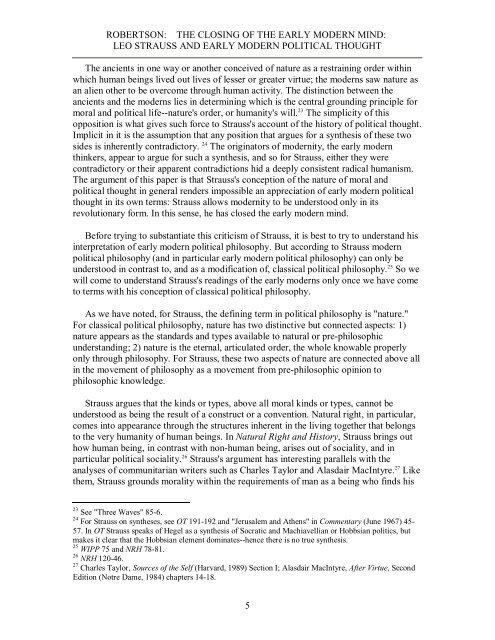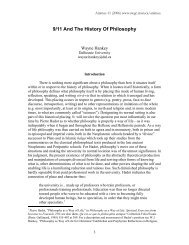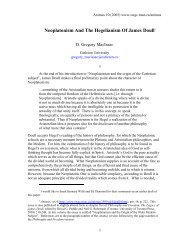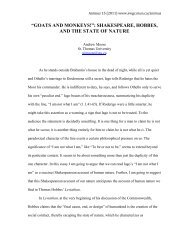Leo Strauss And Early Modern Political Thought
Leo Strauss And Early Modern Political Thought
Leo Strauss And Early Modern Political Thought
You also want an ePaper? Increase the reach of your titles
YUMPU automatically turns print PDFs into web optimized ePapers that Google loves.
ROBERTSON: THE CLOSING OF THE EARLY MODERN MIND:LEO STRAUSS AND EARLY MODERN POLITICAL THOUGHTThe ancients in one way or another conceived of nature as a restraining order withinwhich human beings lived out lives of lesser or greater virtue; the moderns saw nature asan alien other to be overcome through human activity. The distinction between theancients and the moderns lies in determining which is the central grounding principle formoral and political life--nature's order, or humanity's will. 23 The simplicity of thisopposition is what gives such force to <strong>Strauss</strong>'s account of the history of political thought.Implicit in it is the assumption that any position that argues for a synthesis of these twosides is inherently contradictory. 24 The originators of modernity, the early modernthinkers, appear to argue for such a synthesis, and so for <strong>Strauss</strong>, either they werecontradictory or their apparent contradictions hid a deeply consistent radical humanism.The argument of this paper is that <strong>Strauss</strong>'s conception of the nature of moral andpolitical thought in general renders impossible an appreciation of early modern politicalthought in its own terms: <strong>Strauss</strong> allows modernity to be understood only in itsrevolutionary form. In this sense, he has closed the early modern mind.Before trying to substantiate this criticism of <strong>Strauss</strong>, it is best to try to understand hisinterpretation of early modern political philosophy. But according to <strong>Strauss</strong> modernpolitical philosophy (and in particular early modern political philosophy) can only beunderstood in contrast to, and as a modification of, classical political philosophy. 25 So wewill come to understand <strong>Strauss</strong>'s readings of the early moderns only once we have cometo terms with his conception of classical political philosophy.As we have noted, for <strong>Strauss</strong>, the defining term in political philosophy is "nature."For classical political philosophy, nature has two distinctive but connected aspects: 1)nature appears as the standards and types available to natural or pre-philosophicunderstanding; 2) nature is the eternal, articulated order, the whole knowable properlyonly through philosophy. For <strong>Strauss</strong>, these two aspects of nature are connected above allin the movement of philosophy as a movement from pre-philosophic opinion tophilosophic knowledge.<strong>Strauss</strong> argues that the kinds or types, above all moral kinds or types, cannot beunderstood as being the result of a construct or a convention. Natural right, in particular,comes into appearance through the structures inherent in the living together that belongsto the very humanity of human beings. In Natural Right and History, <strong>Strauss</strong> brings outhow human being, in contrast with non-human being, arises out of sociality, and inparticular political sociality. 26 <strong>Strauss</strong>'s argument has interesting parallels with theanalyses of communitarian writers such as Charles Taylor and Alasdair MacIntyre. 27 Likethem, <strong>Strauss</strong> grounds morality within the requirements of man as a being who finds his23 See "Three Waves" 85-6.24 For <strong>Strauss</strong> on syntheses, see OT 191-192 and "Jerusalem and Athens" in Commentary (June 1967) 45-57. In OT <strong>Strauss</strong> speaks of Hegel as a synthesis of Socratic and Machiavellian or Hobbsian politics, butmakes it clear that the Hobbsian element dominates--hence there is no true synthesis.25 WIPP 75 and NRH 78-81.26 NRH 120-46.27 Charles Taylor, Sources of the Self (Harvard, 1989) Section I; Alasdair MacIntyre, After Virtue, SecondEdition (Notre Dame, 1984) chapters 14-18.5
















